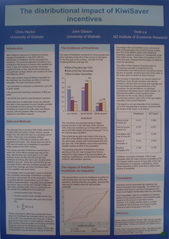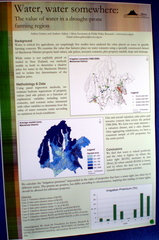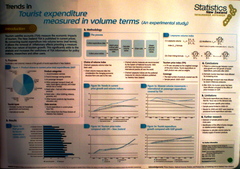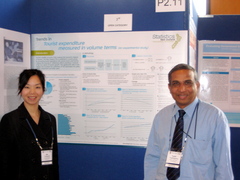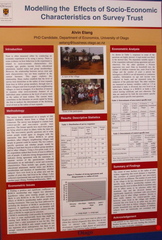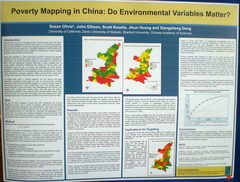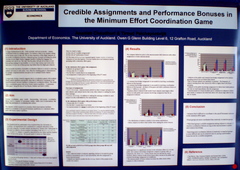 Jan Whitwell Prize
Jan Whitwell Prize
The Jan Whitwell Prize is an award to honour the memory of Jan Whitwell (1944-1993), a former President of the New Zealand Association of Economists (1992-93), distinguished university lecturer and musician. Jan Whitwell died in a road accident in October 1993.
CONDITIONS
- Entry to the Jan Whitwell Prize is open to persons who are either engaged currently in full time study or have completed a thesis or full time study during the preceding eighteen months, and are able to attend and present their paper at the Conference. Entries from overseas that meet these criteria will also be accepted.
- Deadlines for Submission of Abstract and Full Paper as detailed on the conference website, must be complied with.
- Participants must also comply with Conference Registration deadlines as detailed on the conference website.
- Solo authored papers only are eligible for the award. Please note on your abstract submission that you wish to enter the Jan Whitwell Prize.
- The prize is awarded for the best presented paper.
PRIZEWINNERS
The Jan Whitwell prize winners are Damien Eldridge and Nina Walton.
UTS Introductory Econometrics Teaching Prize
We invite you to submit a one-page summary of a teaching idea that works well in an introductory course on multiple regression or time series. The University of Technoloy, Sydneywill award a $500 prize for the best entry.
Entries will be judged on their originality, clarity, elegance and their potential to stimulate student interest. The judge’s decision will be final, and no correspondence will be entered into.
Submitting an entry is taken to imply permission that the entry may be displayed on a notice board at ESAM and/or on a UTS website (with acknowledgement of source) so that other teachers can use the material (without acknowledgement). When submitting your entry, please send a copy with your name removed to allow blind judging. Multiple entries are permitted.
Email submissions may be made to Gordon Menzies by no later than Wed 27 June. Only single-page, electronic submissions will be considered.
Prof Denzil Fiebig (UNSW and CHERE UTS) has agreed to judge the entries.
Click here to view last year’s winner
PRIZEWINNER
The winner of the UTS Introductory Econometrics Teaching Prize is Prof Bob Reed from the University of Canterbury.
NZIER Poster Competition
The poster competition is sponsored by the New Zealand Institute of Economic Research
Description
This competition is in two categories: ‘Post-graduate Student’ section and an ‘Open’ section. Presentation of a poster can be either a ‘work-in-progress’ presentation OR a piece of completed work where the presenter prefers not to make an oral presentation. Presentation guidelines for poster are provided below.
Entry Conditions
To enter under the ‘Student’ category, students must be currently studying post-graduate economics or have completed no earlier than July 2007. There is no residency requirement and students from all countries are welcome to enter. Proof of enrolment for overseas entries may be required.
Anyone who does not meet the above criteria is welcome to enter under the ‘Open’ category.
NOTE: Students cannot enter the same work in both the Poster competition AND the Jan Whitwell Paper competition.
Submission
All entry proposals must be submitted by 30 March through the Call for Papers page.
The finished poster can be brought to the conference by the author.
Submissions will comprise three elements, each of which should be prepared as separate files and submitted by Friday 30 March 2008:
| File |
Upload |
| Abstract of 250 words or less, with up to 5 JEL Subject Codes. | Upload under Abstract Submission on the online form – click here |
| Background paper describing the research problem, methods and results (if completed work). Paper length is not to exceed 10 pages, double-spaced in 12 point type, and should meet the standard paper submission criteria. | Upload under Final Paper at the end of the online form – click here |
| Detailed proposal for the layout of the actual poster (description and planned layout format not to exceed 3 pages). | Upload in the extended abstract section at the end of the online form – click here |
Selection Criteria
To be accepted for entry in the competition, posters must meet the above submission deadlines and:
- Be mounted on a single sheet of card not exceeding an A0 sheet (approx. 1200 x 800mm)
- Present a partially completed (or recently completed) piece of original research
- Outline the research problem/issue and relevant existing literature
- Outline the research methodology
- Discuss any methodological, data or theoretical problems related to the research
- Present any relevant research findings (if completed that far)
- Discuss the relevance of the research to an area of economics
Poster presentations that are accepted for entry will be displayed during the conference in the areas surrounding the main conference venues. Winners will be chosen based on the quality of the research (and coverage of the criteria) and the visual appeal of the presentation.
Presentation Guidelines
To assist you in developing a dynamic poster the following suggestions are offered:
- Mount the poster on a single sheet of card not exceeding an A0 sheet (approx. 1200 x 800mm or 48 x 32 inches)
- Include title, authors, author affiliations, email or other address, a description of the methods used, and conclusions. References and acknowledgements may also be included.
- Select only the most pertinent data to report on the poster.
- Bring handouts that include the abstract and any supplementary information.
Text
- All text should be legible at a distance of 1 meter (3 to 4 feet). Use at least a 24-point type size for the main text. The title type should be at least 4 cm (1.5 inches) high.
- The title should be kept as short as possible so that it can be read quickly.
- Use upper and lower case type throughout the poster. ALL UPPER CASE TYPE IS MORE DIFFICULT TO READ.
- Serif fonts (such as Times) are generally easier to read in the body of the text. Sans serif fonts (such as Arial or Tahoma) are best used in titles, headings, and captions for emphasis.
- Print all text using a laser printer.
- Use bold and/or italics for emphasis.
Graphics and Illustrations
- The poster is a visual format. Use plenty of graphical elements.
- Keep graphics as simple as possible. More complex data can be presented in a handout.
- Photographs should be enlarged to be discernible at a distance of 1 meter (3 feet) and printed with a matte finish (to reduce glare). They are more effective when used sparingly.
PRIZEWINNERS
The winners of the NZIER Poster Competition were announced at the conference dinner.
The winners of the poster competition are:
Open:
1st Chris Hector, John Gibson and Trinh Le “The Distributional Impact of Kiwisaver Incentives”
2nd Arthur Grimes and Andrew Aitken “Water Water Somewhere: The Value of Water in a Drought-Prone Farming Region”
3rd Tantri Tantirigama and Mei Taniguchi “Trends in Tourist Expenditure Measured in Volume Terms”
Student:
1st Alvin Etang “Modelling the Effects of Socio-Economic Characteristics on Survey Trust”
2nd Susan Olivia (and John Gibson, S Rozelle, J Huang and X Deng) “Poverty Mapping in China: Do Environmental Variables Matter?”
3rd Meg Paichayontvijit (A Chaudhun) “Credible Assignments and Performance Bonuses in the Minimum Effort Coordination Game”
WINNING POSTERS
Chris Hector, John Gibson and Trinh Le “The Distributional Impact of Kiwisaver Incentives”
Chris Hector with poster
Arthur Grimes and Andrew Aitken “Water Water Somewhere: The Value of Water in a Drought-Prone Farming Region”
Tantri Tantirigama and Mei Taniguchi “Trends in Tourist Expenditure Measured in Volume Terms”
Mei Taniguchi and Tantri Tantirigama with their poster
Alvin Etang “Modelling the Effects of Socio-Economic Characteristics on Survey Trust”
Susan Olivia (and John Gibson, S Rozelle, J Huang and X Deng) “Poverty Mapping in China: Do Environmental Variables Matter?”

